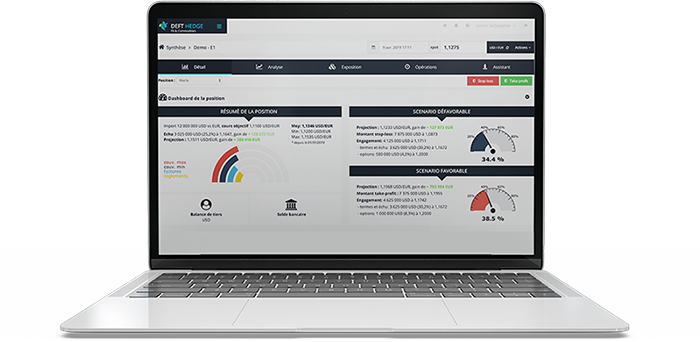Hedging of exchange rate risks.

When companies buy or sell on international markets, transactions are carried out in foreign currencies.
Depending on economic conditions, exchange rates between currencies can fluctuate significantly and have a real impact on your company’s finances.
In order to protect yourself against exchange risks, you should therefore anticipate the various fluctuations as far as possible. To optimise your buying and selling operations on the markets, DeftHedge now offers you a Saas solution to implement your currency hedging strategy.
What is currency hedging ?
The instability of exchange rates means that it is not possible to predict the profits you will make from a sale or purchase transaction in foreign currency.
In order to prevent exchange rate fluctuations from affecting your company’s finances, it is therefore essential to put in place various measures to hedge against exchange rate risk.
To protect yourself against this risk, there are several solutions available today.
Natural hedging :
The objective of natural hedging is to balance all buying and selling transactions in the same currency in order to eliminate any exchange rate risk. To adopt this type of strategy, it is necessary to completely relocate your company’s production to the country where you wish to trade.
Financial hedging :
To protect yourself against exchange rate risks while keeping your company in your country, there are other hedging strategies available. Thus with financial hedging you can use different instruments through the foreign exchange market (currency market or FOREX).
How to calculate the exchange rate risk coverage ?
The implementation of this strategy is proving to be particularly interesting for many companies. In fact, as international trade is increasing, it is essential to take appropriate measures to limit exchange rate risks as much as possible.
A certain budget is required to set up these protective measures. Depending on the company, the type of market and the bank, the cost of hedging exchange rate risk will vary. Indeed, the cost of implementing such a strategy will be impacted by different fees:
- Fixed costs
- Exchange commissions
- Transaction fees
- Application fees
In order to reduce these costs, DeftHedge offers you its foreign currency cash management solution specially adapted to your company’s activity.


How to register an exchange risk hedge ?
Since 1 January 2017, the registration of currency hedging arrangements has been simplified. The accounting treatment of forward financial instruments and hedging transactions was amended by Regulation 2015-05 of 2 July 2015.
These new rules have a significant impact on the financial statements for the fiscal years since hedging risks are directly included in the company’s financial statements.
These changes are reflected at various levels:
- Application of the principle of symmetry for hedging transactions
- Application of the precautionary principle for operations in the isolated open position
- Redefinition of the overall foreign exchange position
- New dedicated accounts in the General Chart of Accounts (PCG)
What are the instruments used to hedge foreign exchange risks ?
Via the foreign exchange markets, a number of foreign exchange hedging instruments are therefore available to companies. Among the various financial protection instruments are the following:
- Forward contracts: firm agreement between the seller and the buyer on the price and amount of a transaction. Delivery and payment for this transaction are made at a later date.
- Currency swaps: for this transaction, two parties undertake to modify the date of a flow fixed by the terms of a forward contract.
- Currency options: a right whose value (premium) is paid by the buyer of the option to the seller of the option.
- Zero-premium contracts: agreement fixing a range of exchange rates within which the company undertakes to carry out the transaction (valid for both the sale and the purchase).
These various financial instruments are therefore essential to enable companies to be better protected against exchange rate risks and the potential financial losses they may entail.
What is the currency option?
In this transaction, the seller gives the buyer the possibility of exchanging a certain quantity of foreign currency on a pre-arranged date in exchange for the payment of a certain premium.
By opting for a currency option, the company is therefore guaranteed a certain exchange rate for the completion of the transaction, while retaining the possibility of completing the transaction before the expiry of the option if the exchange rate is more interesting.
Depending on the strike price, the currency option will be qualified differently:
- Currency option “in the money”: strike price more interesting than the market price.
- Out-of-the-money” foreign exchange option: exercise price less attractive than that offered on the market
- Currency option “at the currency”: exercise price equal to the market price
Why choose DeftHedge for your exchange rate accounting
To optimise your company’s financial management as much as possible, you should use the most suitable instruments. In order to best meet the needs of professionals, DeftHedge therefore offers you its SaaS solution enabling you to accurately monitor, manage and control your foreign currency cash flow.
With our tool, you will be able to follow the impact of exchange rates and adapt your strategy regarding your foreign currency purchases and sales.
For optimal currency hedging, take advantage of DeftHedge’s various functionalities.
